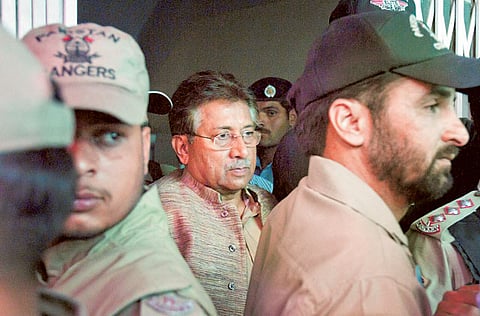Pakistan former military ruler Pervez Musharraf sent to 14-day judicial remand
Former president to be lodged in farmhouse due to threats to life

Islamabad: An anti-terrorism court on Saturday sent former military ruler Pervez Musharraf to 14-day judicial remand in a case involving charges he had detained around 60 judges of superior courts for months after imposing emergency in Pakistan on November 3, 2007.
The Islamabad administration declared his suburban farmhouse a sub-jail where the 69-year old former army chief, who faces excruciating legal battles, will be lodged under stringent security because of threats to his life from Pakistani Taliban and other quarters.
Anti-terrorism court judge Kausar Abbas Zaidi ordered the police to present the accused again in the court on May 4 – just a week before parliamentary elections that prompted him to return from four-year self-exile with a mission he said was aimed at saving the crisis-ridden homeland.
His election hopes were shattered as election officers rejected his candidature from four constituencies, Musharraf’s interim bail was cancelled on Thursday by Islamabad High Court judge Shaukat Aziz Seddiqi, who ordered his arrest and added terrorism to charges against him.
Musharraf escaped from the IHC premises to his residence and the Islamabad police implemented the arrest order on Friday, though his All Pakistan Muslim League (APPML) said he surrendered to the authorities and that he respects court order.
The former president was transferred from the farmhouse to the Police Line Headquarters in the capital after formal arrest, and spent the night there.
He was driven to the anti-terrorism court Saturday morning in a convoy, with police commandos and paramilitary troops providing the security cover reminiscent of his hey days when the ruled the Islamic Republic with absolute powers in his dual capacity as president and army chief for around nine years.
“Traitor, Traitor,” shouted a group of lawyers during his appearance at the anti-terrorism court and as left after the hearing. An insignificant number of Musharraf’s supporters, whom he saluted, chanted slogans in his favour but at the cost of being roughed up by the opponents.
Politicians, including members of the Senate, the upper house of the parliament, have voiced anger over alleged “preferential treatment” in the case of the former dictator and demanded action against those police officials found responsible for the former dictator’s flight from the courtroom.
Incidentally, a wind storm before dawn in the capital razed a four-foot section of the boundary wall of Musharraf’s sprawling farmhouse, worrying the security apparatus and a repair team immediately deployed by the administration rebuilt the damaged portion.
A three-judge Supreme Court bench is due to resume on Monday hearing of five petitions seeking Musharraf’s trial for treason under Article 6 of Pakistan’s constitution pertaining to its abrogation or suspension.
In a verdict on July 31, 2009, the Supreme Court had declared the 2007 emergency clampdown by the military president violation of the constitution, which is the main ground cited in the petitions. The government has been asked by the court to clearly spell out its stance in the matter.
Musharraf is also accused over the 2006 killing of Baloch Nationalist Leader Akbar Khan Bugti ant in the case of 2007 Benazir Bhutto assassination.
Local media reports said an interim bail granted to Musharraf on April 17 in Benazir Bhutto murder case by the Rawalpindi bench of Lahore High Court was in jeopardy as he has not deposited the court-ordered surety bonds of rupees one million.
A national daily quoted former president’s counsel, Qamar Afzal, as saying that now that his client had been arrested “it doesn’t matter” as the interim bail by the high court was meant to prevent arrest.
Sign up for the Daily Briefing
Get the latest news and updates straight to your inbox



